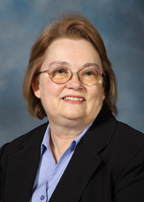 Recently finished with her post-doctoral work, M. Patricia Leuschen, Ph.D., had just come back from an international conference in Germany, and stopped in at UNMC to check her messages.
Recently finished with her post-doctoral work, M. Patricia Leuschen, Ph.D., had just come back from an international conference in Germany, and stopped in at UNMC to check her messages.
With her youngest child, 7-month-old James Patrick, in tow, Dr. Leuschen was hesitant when lab technician Joan Spencer told her to introduce herself to recently hired neonatologist Robert Nelson, M.D., who was looking for someone to direct the newborn medicine research program.
“I didn’t want to go to see him, because I really wasn’t dressed appropriately. I had just come in to catch up on a couple of things,” said Dr. Leuschen, an associate professor in four departments and a fellow in the Graduate College. “In the end, I did go and I learned that to get a job with a pediatrician, it does not hurt to have a cute new baby in hand.”
Next week, a quarter-century after Dr. Nelson hired her, the veteran researcher and longtime director of the Medical Sciences Interdepartmental Area (MSIA) Graduate Program will have something else in hand: the inaugural UNMC Outstanding Mentor of Graduate Students Award. Dr. Leuschen will receive the award at the Annual Faculty Meeting, which begins at 4 p.m., Wednesday, April 20, at the Durham Research Center auditorium.
A western Iowa native who grew up when space exploration was burgeoning, Dr. Leuschen knew she wanted to pursue work in the health sciences upon her enrollment at Creighton University. Mentors encouraged her to stay for a master’s degree in biology and she continued graduate work at UNMC for another master’s degree (in anatomy) and her doctorate, which she earned in 1976. She completed her postdoctoral training in cellular physiology in 1980.
Her research has focused always on the neurosciences, looking at the molecular and cellular aspects of brain tissue associated with the neurological diseases. Specifically, Dr. Leuschen looked at the “blood brain barrier” in premature babies, using animal models and cell models. During the past decade, her work has shifted from being cell/molecular-oriented to the use of transitional disease models of multiple sclerosis. She also has taught a graduate course in cell culture for the past 26 years.
In 1989, Dr. Leuschen became the chair of the MSIA program. While it gave her access to graduate students who could help in her pediatrics laboratory, the position became a means through which she would see many students, with little or no research background, blossom into independent researchers.
“One of the unique aspects about graduate education is that you get to watch students mature,” Dr. Leuschen said. “You’re in close contact with the students throughout the entire process, and you get to watch these students become scientists.”
During her tenure as chair of the MSIA program, it has graduated 86 Ph.D. and 92 M.S. students from l7 different departments. Those numbers represent more than 25 percent and 45 percent, respectively, of UNMC’s Ph.D. and M.S. graduates. Over that same time, Dr. Leuschen has personally supervised 15 of the graduate students and has served on the committees for more than 40 others.
It’s not just the numbers, however, that make Dr. Leuschen an outstanding mentor, said David Crouse, Ph.D., associate dean for graduate studies and associate vice chancellor for academic affairs.
Dr. Crouse explains that Dr. Leuschen has mentored mostly non-traditional students who take the MSIA route. Many of these students come from under-represented groups, and some already have a professional degree but need research experience.
“Advising and mentoring those students requires an ability to deal with their varying personal goals and needs as well as an entrepreneurial approach to finding appropriate research laboratories and funds for their support,” Dr. Crouse wrote in his nomination of Dr. Leuschen.
Many of the MSIA graduates have become faculty at UNMC or elsewhere; some have been attracted or retained in a senior technical staff position; and still others have continued their career development in a clinical area. “All together, Dr. Leuschen, the MSIA program and UNMC have been an important component in the professional development of many, many students,” Dr. Crouse said.
The work, Dr. Leuschen says, is never boring. She recounts the story of a dozen refugee Afghan physicians who came to Omaha en masse in the early 1990s. Within days, Dr. Leuschen had found appropriate laboratories in which they could work. Dr. Leuschen still gets nervous when her mentees defend their dissertations. “It’s usually better if I just stay away from them on the day they’re defending,” she said.
She says her contact with international students has increased her interest in foreign travel and hosting foreign visitors through the Sister City organization. She sometimes plans a vacation and then watches while her four children – now living in Toronto, Washington, D.C., Kansas City and Omaha – decide that they’ll travel with her.
Ask Dr. Leuschen about the most enjoyable part of the mentoring, and her answer is simple: “Hooding a student. The most fun is when you get to call one of your former students, ‘Doctor.’ When you hood them at graduation, you symbolically kick them out of the nest to go fly on their own. That’s the best part.”